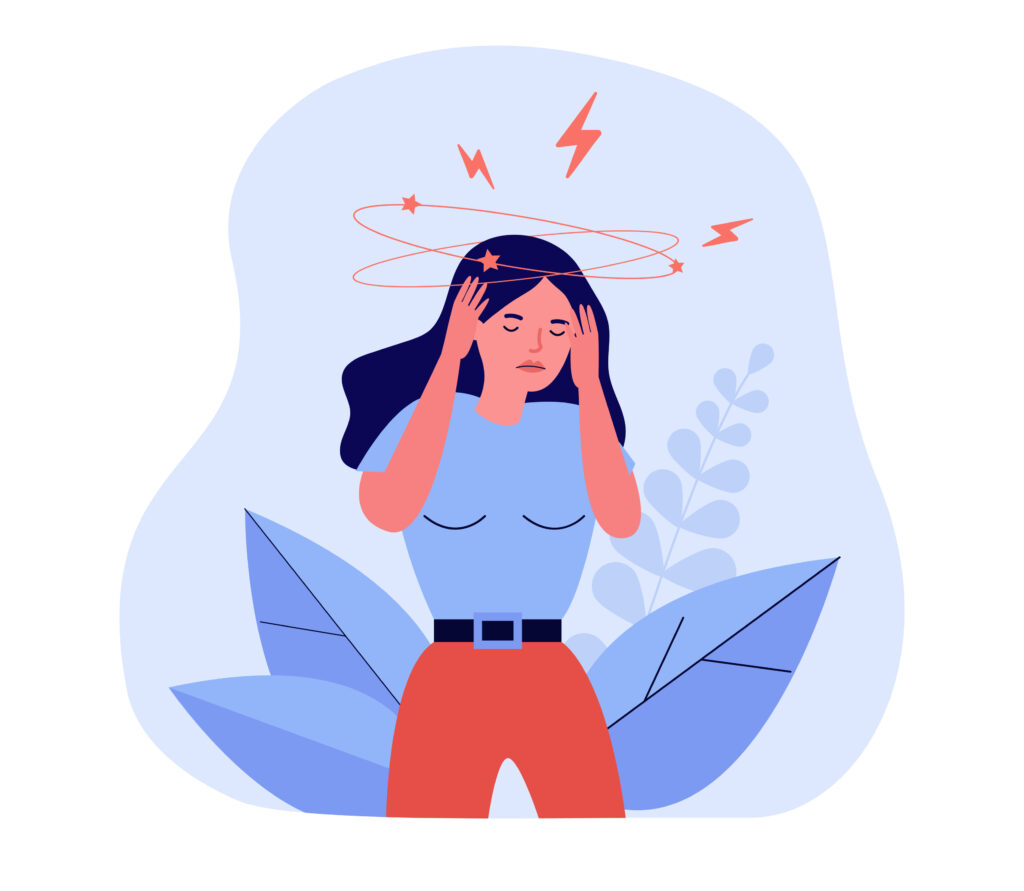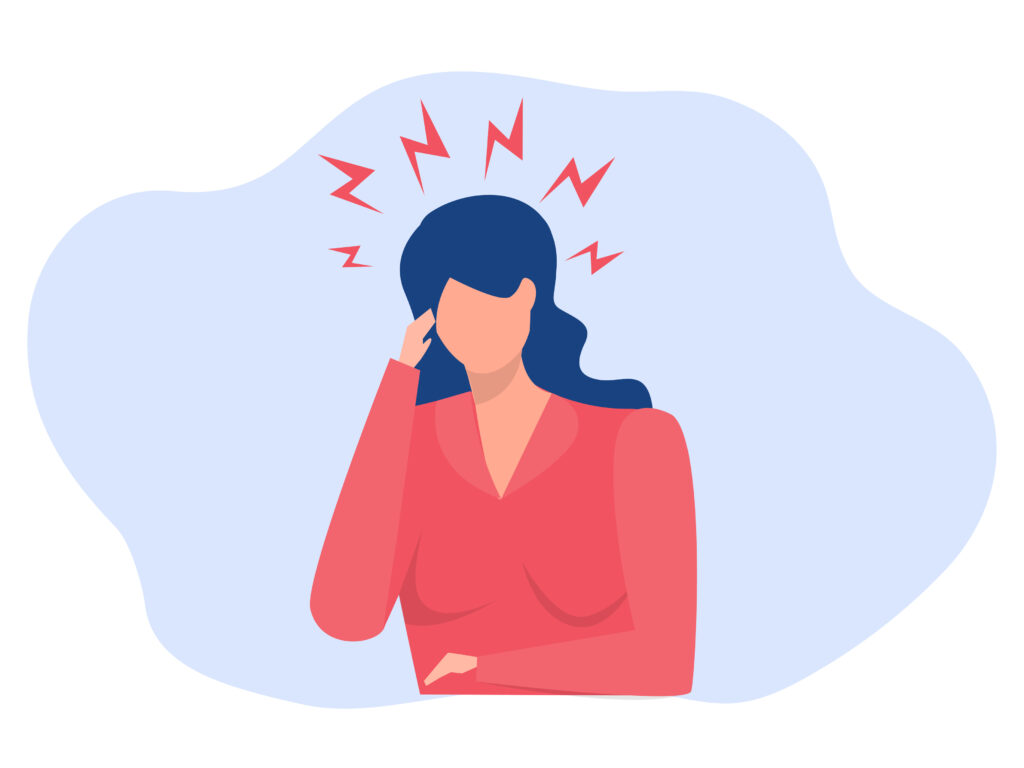If you’ve ever stopped taking antidepressants or skipped a dose or two, you may have experienced a sensation known as ‘brain zaps’. While there’s no technical name for it, brain zaps are a common reference to the tingling, jolting, or electric-shock-like sensations that can occur in the body and brain. They can happen when a person decreases or stops using certain medications, particularly antidepressants.
What Are Brain Zaps?
To understand what brain zaps are, we have to understand how antidepressants work.
One of the most common classes of medications involved in depression and anxiety treatment is Selective Serotonin Reuptake Inhibitors (SSRIs). Serotonin is a neurotransmitter molecule that assists with mood regulation and emotions. SSRIs prevent the reabsorption of serotonin to elevate serotonin levels in the brain.
Suddenly stopping antidepressants, also known as abrupt discontinuation, can lead to withdrawal symptoms and a phenomenon called antidepressant withdrawal syndrome. While it’s not 100% understood why the side effects happen, it appears to be a reaction to the brain adjusting to changes in the amount of serotonin.
Experiencing occasional brain zaps is a withdrawal symptom of antidepressant discontinuation that patients report.
Avoiding Antidepressant Withdrawal Syndrome
Oftentimes, choosing the best mental health medication is a process that can take months or years. Withdrawal symptoms, like brain zaps, can occur when individuals do not gradually come off of one medication before trying another. While ‘brain zaps’ are generally mild and go away on their own or are rapidly reversed by the reintroduction of the original medication, they can typically be minimized by a slow tapering down of the drug.
Antidepressant withdrawal symptoms include:
- Brain zaps, or brain shivers
- Flu-like symptoms
- Headaches
- Dizzy spells
- Nausea
- Irritability
Patients who are stopping an antidepressant must discuss the best method of tapering with their psychiatrist, instead of stopping cold turkey. Abrupt discontinuation of an SSRI can trigger antidepressant discontinuation symptoms, especially if the patient has been on medication for a long time. If you are interested in stopping your antidepressants and trying a non-medication alternative for depression like TMS therapy, call us today to book an appointment with one of our psychiatrists.
How Do I Know If I Have Antidepressant Discontinuation Syndrome?
If you’re experiencing disequilibrium, gastrointestinal symptoms, flu-like symptoms, sensory disturbances (like brain zaps), sleep disturbances, or other symptoms, you should discuss them with your healthcare provider.
What Does a Brain Zap Feel Like?
Brain zaps can cause varying levels of discomfort. For some, brain zaps feel like a brief shock, while others describe the sensation as a tingling or shivering. In short, they can be described as short bursts of “zapping”. While research has not identified a definitive trigger for brain zaps, most people report experiencing brain zaps while starting or stopping an antidepressant medication. Others theorize that stress, anxiety, or exhaustion may play a role.

Should I Be Concerned When Brain Zaps Happen?
The most important thing to do when you feel electrical sensations is to call your doctor. Even if you’re following the antidepressant withdrawal plan correctly, your doctor may want to adjust the dosage.
Another point to consider if you are experiencing brain zaps or brain shivers is to remember if you took the right medication dosage or not. People can forget a pill or miss a dose. Returning to your regular dosage may help stop the sensation.
How To Mitigate Brain Zaps
New research about CNS disorders shows that restarting the medication was helpful in nearly 57% of brain zaps cases, and avoiding any lapses in dosage helped almost 39% of patients prevent brain zaps 1.
For discontinuation symptoms like headaches and nausea, you can take over-the-counter medication as directed by your medical provider.
Other options to limit the side effects of discontinuation syndrome include:
- Scheduling the dosage tapering off for a weekend or during a few days off work.
- Setting an alarm to remind you to take antidepressant medication.
- Limiting stressful or anxious events during trial-and-error phases of SSRIs
- Being open and honest with your doctor about side effects.
- Ask your doctor if there’s a medication or supplement, like melatonin that is safe to take if you’re having sleep disturbances. When you’re tired, you are more likely to have mood changes and other side effects.
When Brain Zaps Aren’t SSRI-Related
If you found this article because you were looking for information about brain zaps, but you aren’t adjusting to or tapering off an SSRI, there are other medical conditions that can have similar symptoms to brain zaps.
For example, multiple sclerosis has a side effect known as “zingers,” which may be very similar to brain zaps. Trigeminal Neuralgia is a nerve disorder in the head that causes intense, shocking pain.
Should You Stop Taking Selective Serotonin Reuptake Inhibitors?
Discontinuing an antidepressant or selective serotonin reuptake inhibitor (SSRI) medication can be a challenging process for many people. Stopping an SSRI medication without proper medical supervision can be dangerous and potentially harmful to one’s physical and mental health. Abruptly stopping the medication can lead to an increased risk of relapse of the underlying condition that the medication was initially prescribed for, such as depression or anxiety. In addition, some withdrawal symptoms can be severe, which can cause significant distress and interfere with daily functioning.
Brain zaps are an uncomfortable and disconcerting symptom that can occur during SSRI withdrawal, but they are usually mild. If you are experiencing SSRI brain zaps or other SSRI side effects and are considering stopping your medication, it is very important to speak with your doctor or a psychiatrist beforehand.
Psychiatrists are medical doctors specialized in the treatment of mental health conditions and are trained in the management of SSRI withdrawal. They can help individuals taper off the medication gradually, monitor their symptoms, and provide appropriate medical interventions if necessary.
For some patients, the potential symptoms and withdrawal symptoms of SSRIs and other antidepressant medications can make them feel hesitant to seek treatment. However, it is highly recommended that individuals experiencing side effects or brain zaps1 while discontinuing their SSRI medication seek the advice and guidance of a qualified psychiatrist.
Antidepressant Alternatives
It’s important to discuss your health questions and concerns with your provider. It is also important to avoid changing the dose of your current medication without discussing a safe discontinuation plan with your healthcare provider. Not to mention, oral antidepressants are not the only treatment option for those experiencing depression, anxiety, and more.
If antidepressant medications aren’t working for you, or if you are experiencing unwanted side effects like brain zaps, don’t give up. At Neuro Wellness Spa, we offer antidepressant alternatives that can help you mitigate, consider trying alternative treatments for depression. It’s important to understand that there are many other safe and effective options to consider when looking to treat your depression or anxiety including:
TMS therapy
Transcranial magnetic stimulation therapy, or TMS therapy for short, is a non-invasive, non-medication, FDA-approved medical procedure used to treat depression. TMS uses magnetic pulses to target specific areas of the brain associated with mood regulation. TMS has far fewer side effects than SSRI medications and can be just as, if not, more effective than traditional antidepressants.
Talk Therapy
Psychotherapy is often the first line of treatment for mental health conditions. It is well known that undergoing therapy while taking medications increases the effectiveness of treatment. The medications help by giving you relief from your symptoms, while therapy helps you address the underlying causes and teaches you how to effectively manage them long-term so that you may get to a point where you no longer need medications and can taper off safely.

Get Started with Mental Health Treatment in California
The phenomenon of “brain zaps” associated with SSRI usage underscores the intricate interplay between neurochemistry and medication effects on the central nervous system. While the exact mechanisms underlying these sensations remain subject to ongoing research, it is evident that abrupt discontinuation or changes in SSRI dosages can trigger these peculiar electric-like sensations.
Furthermore, for individuals who find that SSRIs are not yielding the desired results or are struggling with side effects like brain zaps, consider exploring alternative treatments such as TMS therapy. TMS is effective, FDA-approved, and covered by insurance. At Neuro Wellness Spa, individuals can access all of our treatments under the guidance of experienced mental health professionals, fostering hope for improved mental health and well-being.
If you have questions about alternative treatments for depression or another mental illness, schedule an appointment with a psychiatrist. We offer medication management, TMS therapy, and in-person or online talk therapy, all covered by insurance. Get started today.
References
- Papp, A., & Onton, J. A. (2018). Brain zaps. The Primary Care Companion for CNS Disorders, 20(6). https://doi.org/10.4088/pcc.18m02311